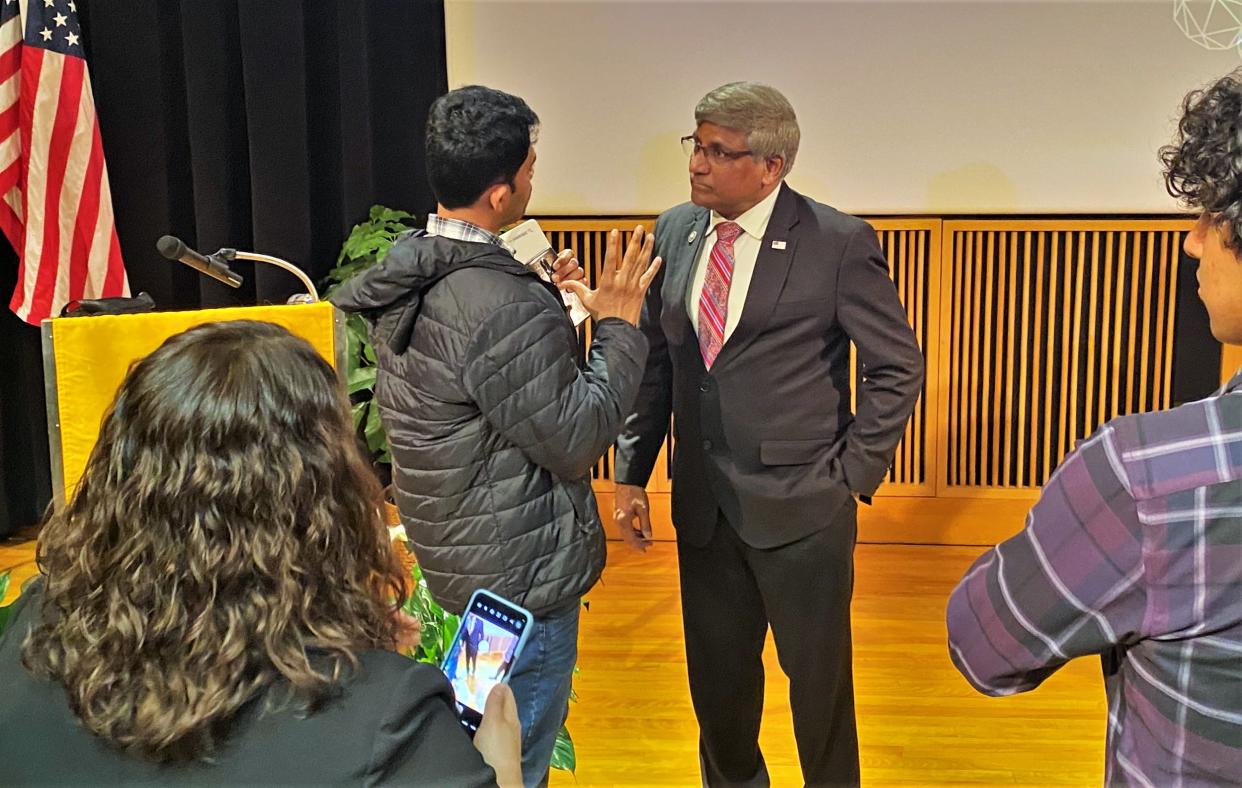National Science Foundation director inaugurates President's Distinguished Lecture Series

The National Science Foundation director on Monday asked the University of Missouri community and beyond to partner with the agency.
"The time is now," NSF director Sethuraman Panchanathan told the audience in Monsanto Auditorium in the Bond Life Sciences Center.
His talk "Innovation Anywhere, Opportunities Everywhere: Accelerating the Frontiers of Science and Technology" was the inaugural President's Distinguished Lecture.
He told everyone to drop any vacation plans they have.
"We need every one of you," he said. "We need all your ideas. We need to inspire high school students."
The NSF isn't a monolith, he said.
"I want to be your partner," he said. "I need your ideas. I need your solutions. NSF is here to serve you."
He touched on many topics as he paced the stage in an animated manner, sprinkling in references to MU researchers during his talk and drawing applause.
The audience of university and community dignitaries, faculty members and students included MU Nobel laureate George Smith. Panchanathan referred to Smith at least a half-dozen times, each time referring to him as John Smth.
Smith joked after the talk that he thought Panchamathan was referring to a colleague.
Everyone must be included in NSF's mission, Panchanathan said.
"We cannot, we should not, leave any talent behind," he said. "It is not for a chosen few places. It is not for a chosen few institutions."
He called the partnerships among the NSF, universities and private industry a 'symbiotic relationship," using the term hyper-partnerships several times.
It requires more than 300 computer scientists at 80 international institutions on eight telescopes to discover the Black Hole at the center of the Milky Way, he said.
NSF is funding artificial intelligence institutions at several universities.
"We need AI in every place in our nation," Panchanathan said. "It cannot and should not be limited to NSF-funded institutions.
Though AI is in the news recently, NSF has been funding AI research for more than 50 years, he said.
"It didn't just magically happen," he said.
MU is part of an NSF-funded AI Institute for Resilient Agriculture, he said.
He praised MU researchers David Mendoza-Cozatl and Ron Mittler for their discoveries related to plant sciences.
He also mentioned James Bircher for his work with gene editing in plants.
Mahmoud Almasri at MU is developing technologies to quickly detect food-borne pathogens, he said.
"These are the kind of innovations - in-place innovations - that the University of Missouri makes possible," Panchanathan said.
Innovation can't be limited by location, he said.
"Anything is possible anywhere," he said. "I'm deeply convinced of that."
He was asked by an audience member about the role of education and teaching in his philosophy.
It's important, he said, but the most important aspect of teaching is the learning students do.
"If you want good STEM-inspired kids, you need good STEM-inspired teachers," he said. "Learning happens everywhere."
An audience member who identified himself as an advocate of hydrogen power asked Panchanathan about the energy future.
The directory said the agencies in the federal government are "tightly synchronized" around the topic."
He urged the audience member to contact him with his suggested solutions.
Addressing climate change requires smart solutions, he said, speaking with reporters after his talk. This is science, mitigation, adaptation, resilience and technology.
"So there is a resilient planet initiative of NSF that we put together when we're working in partnership with NOAA, Department of Energy, NASA and others, so that we might build the solutions, the ideas and translation of those solutions into the industries of the future," he said.
He returned to his theme that solutions and innovations require everyone.
"Because without that inspiration, as I told you, you will never get to the comprehensive solutions to solve problems like climate change," he said.
People everywhere have solutions, he said.
"Every citizen has got an opportunity to contribute, to learn and also express their innovative capacity in ways that can benefit themselves," Panchanathan said.
Roger McKinnney is the Tribune's education reporter. You can reach him at rmckinney@columbiatribune.com or 573-815-1719. He's on Twitter at @rmckinney9.
This article originally appeared on Columbia Daily Tribune: NSF director says science solutions can happen anywhere from anyone

